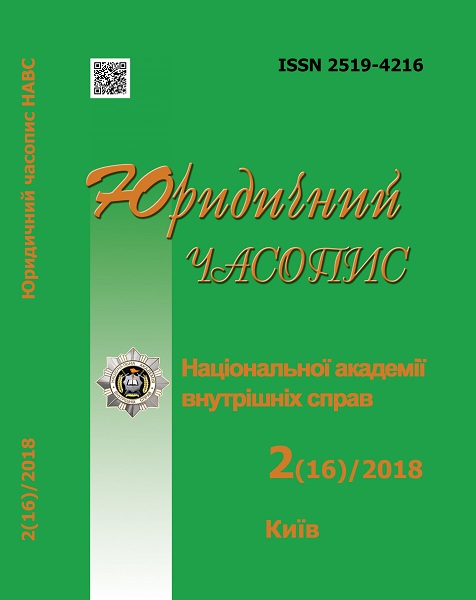The Guilty Principle is a Fundamental Legal and Constitutional Basis of Criminal Liability
Keywords:
criminal responsibility, subjective party, crime, composition of crime, fault, intent, carelessness
Abstract
Тhe article comprehensively deals with the principles of guilt as a legal, constitutional, criminal procedural and criminal-law category. The materials of the national court practice and practice of the European Court of Human Rights are analyzed. The connection between the guilty principle and other principles of criminal law was determined, as well as amendments to the current criminal legislation of Ukraine were proposed. Principle of guilt means that domestic criminal law rejects the possibility of objective criminality, that is, the prosecution of opinions, certain beliefs, accidental damage. The psychological content of each crime (wine as a mandatory sign of the subjective part of the crime) is closely linked to its external expression (the objective side of the crime), which is manifested in the following: a person who has all the features of the subject of the crime , in each crime reveals his personal attitude to the outside world, society and to an individual. Given the close connection between the subjective and objective side of the crime, which form a combination of internal (psychological) and external signs of one phenomenon – a crime, it should be noted that the crime as a specific act of human behavior is a psychophysical unity in which external manifestations of behavior (the act as a sign of the objective side of the crime) and the changes that have been caused to it, in the objective reality, are inextricably linked with the inner side, which are the mental processes that generate, direct and regulate human behavior (sub The active side of the crime). Therefore, when qualifying a crime, it is necessary to establish the specified connection in order to avoid objective censure, adhering to the guilty principle. The development of criminal-law science necessitates the adaptation of understanding of the principles of criminal law in terms of their systematization and definition of content. Such an adaptation is the modernization of the criminal code in order to strengthen the fight against crime. This necessitates the prediction of the principles of criminal law at the legislative level.Downloads
Download data is not yet available.
Abstract views: 532 PDF Downloads: 104
How to Cite
[1]
Veresha, R. 1. The Guilty Principle is a Fundamental Legal and Constitutional Basis of Criminal Liability. Law Magazine of the National Academy of Internal Affairs. 16, 2 (1), 236-243.
Issue
Section
Combating crimes: theory and practice
Copyright (c) 2019 Law Magazine of the National Academy of Internal Affairs

This work is licensed under a Creative Commons Attribution-NonCommercial-NoDerivatives 4.0 International License.
- Authors reserve the right to authorship of their own work and transfer to the magazine the right of the first publication of this work under the terms of the Creative Commons Attribution License, which allows other persons to freely distribute published work with mandatory reference to authors of the original work and the first publication of an article in this magazine.
- Authors have the right to enter into separate additional agreements on non-exclusive dissemination of the work in the form in which it was published in the journal (for example, to post an article in the institution's repository or to publish as part of a monograph), provided that the link to the first publication of the work in this journal is maintained.
- The journal's policy allows and encourages the posting of articles by authors on the Internet (for example, in electronic storehouses of institutions or on personal websites), both before the submission of this manuscript to the editorial office and during its editorial processing, as this contributes to the creation of a productive scientific discussion and positively affects the efficiency and dynamics of citing the published work.




